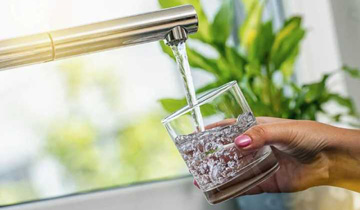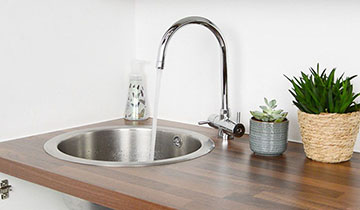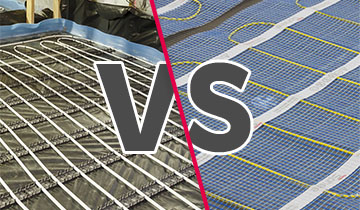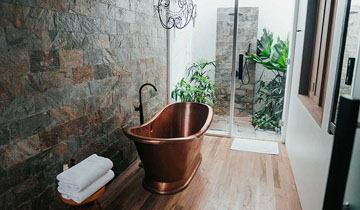6 min read
What are instant water heaters and are they any good?
According to research by Water UK, the average person in the UK uses 142 litres of water a day. However, the same research also highlights that many...

Over the last couple of years awareness of the need to reduce carbon emissions has intensified. From the UK Government’s drive to ban gas boilers in new builds by 2025 to changes in the soon-to-be-released SAP 10 calculations which favours electric over gas heating. These are all part of a much larger plan to help the UK bring all greenhouse gas emissions to net zero by 2050.
But what about water?
Here’s some interesting water facts for the UK:
Now, they are some pretty staggering facts!
Have you ever heard of water stress? It occurs when the demand for usable and safe water is greater than the supply. In England, over 50% of water companies are operating in an area under water stress.
But doesn’t it rain every other day in the UK?
It can often feel like that but even though hotter and much drier summers are predicted like the one we had in 2018, water companies are capturing much less rain water than we think.
There is also the rising population of the UK to be mindful of. The steeper the rise, the steeper the rise in demand for water. In fact, we use half of all public water use in our homes.
Then there is the increase in cost of living, in particular the increase to our energy bills. Reducing water waste by becoming more water-efficient will allow us to make a positive dent to those rising energy bills.
So, what are the most practical changes we can make around the home that will help the UK reduce its water waste further.
You may have heard of some of these before but in no particular order…
In the UK the average household loads up their washing machine five times a week which uses a total of 425 – 450 litres of water. Along with ensuring you completely fill the washing machine up before starting the cycle, it’s worth checking the credentials of a washing machine before you make the purchase.
Don’t just but on the energy rating of the washing machine because that doesn’t take into consideration the water consumption. Remember to check the labelling for any water consumption figures. The most efficient washing machine will use around 6 litres of water per wash and the least efficient around 14.
For those of us who have a dishwasher there is a really simple thing to stop doing which saves a significant amount of water of the course of a year. What is it? You guessed it. Avoid rinsing dishes before loading them in the dishwasher. Modern dishwasher detergents are extremely effective at removing the toughest of dirt on your crockery.
If you haven’t got a dishwasher, now is the time to think about investing in one. Dishwashers use much less water than washing up by hand and not to mention the time you save. Also, remember to look at the capacity of the dishwasher to ensure it’s enough for the size of your household. The most water efficient dishwasher uses only 7 litres of water for one cycle which is a stark contrast to the average dishwasher which uses an average of 23 litres!
Not only is the sound of a constantly dripping tap pretty annoying, it can also waste over 5,000 litres of water each year if it isn’t fixed.
The most common cause of a dripping tap is due to parts wearing away over time especially washers or seals of conventional faucets. Other taps such as washer less taps, can also start leaking due to the seals at the inlet and outlet pipework breaking down over time.
According to Local Heroes, the average cost to get a dripping tap repaired is £126 but it is worth shopping around to find the best price without negating the quality of work.
As tough as it may be at first, changing your bathroom habits will reduce water waste significantly. Swapping from baths to showers is a good place to start. However, in the UK, we spend up to 8 minutes, on average, in the shower which can use between 60 and 90 litres of water! So how can you reduce that further? Change your shower head!
There’s an array of water-saving shower heads available and a great buyer’s guide is available on the Which? website. There are two types available; aerating shower heads and non-aerating shower heads. Aerating shower heads mix air with a restricted flow of water and does this at high volume. A non-aerating shower head restricts water flow by pushing it out small holes which means it comes out at a high pressure.
An important point to note, is that if you have an electric or low-pressure shower then a water-saving showerhead may not be suitable.
The way you brush your teeth can really impact how much water you waste. What do I mean? Well, if you are one of those people that leave the cold tap running whilst you are brushing your teeth, then you are wasting between 5 – 6 litres of water every minute. So next time you are brushing your teeth, remember to turn the tap off which will save you money in the long term and that’s another reason to smile.
Here’s some key facts about water use in the garden:
There’s a multitude of water saving changes you can implement around the garden. From the plants you choose (less ‘water needy’) to using rain water to water your beautifully landscaped flowerbeds. Start of by taking small steps. Every litre you save means a 0.1p saving on your bill not to mention reducing the energy you use to heat water for washing which all adds over time.
This final point relates to something mentioned earlier in this article:
‘We waste 63.5bn litres of water each year by waiting for showers to reach the desired temperature. That’s enough to fill 25,400 Olympic sized swimming pools.’
Waiting for hot water leads to a huge amount of unnecessary water and energy waste. That’s where point of use water heaters come in.
With point of use hot water heaters, there is no waiting for the water to reach your desired temperature. It’s instant. Because they are small in size they can easily be plumbed into your existing system and installed under the kitchen or bathroom sink.
Are they energy efficient? They sure are! Why? They eliminate water waste generated whilst waiting for the hot water travelling through a series of pipes to get to the source of use. The energy used to heat the water that cools in the pipes after the need for hot water ends is wasted meaning water and energy is wasted. This isn’t the case with point of use hot water heaters.
Along with working towards reducing our carbon emissions, reducing water waste is another key focus to help minimise our impact on the environment. These simple tips to consider not only help you to be more environmentally conscious but will also help you to reduce household bills over time.
If you need further advice or some top tips, our team are always on stand-by to help walk to help. Simply, get in touch.

6 min read
According to research by Water UK, the average person in the UK uses 142 litres of water a day. However, the same research also highlights that many...

11 min read
In this heating blog article, we will be walking you through both water underfloor heating and electric underfloor heating to help you decide what...

5 min read
It’s that time of the year where we take an honest look at bathroom design trends for 2023. So, we’ve scoured the internet, read through a heap of...